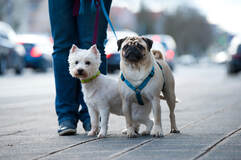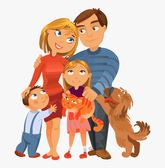|
If you own a dog, you have probably found yourself wondering “How much exercise does a dog need every day?” Depending on your schedule, that question might sometimes sound more like “How much exercise does a dog really need every day?”
As with people, the answer varies from dog to dog and is dependent on age, health, and breed. There are a few standard guidelines you can follow, however, to make sure that your dog is getting all the exercise she needs. How Much Daily Exercise Does a Puppy Need? You might have noticed that your puppy gets a case of the “zoomies” several times a day. The zoomies are easily identified, and symptoms include madly racing around the house, followed by collapsing into a puppy pile, preferably in your lap. Puppies generally have more energy than adult dogs and so require more exercise in short bursts — like the zoomies. Since puppies are constantly growing, including several short walks or play sessions throughout the day is a safer choice than going for one really long walk, as this can be too hard on your puppy’s developing body. Ultimately, every puppy is different, and the more time you spend with your pup the more you will learn about how much exercise she needs to keep her happy — and you sane! Talk to your vet or breeder about how much daily activity is appropriate for your puppy, and don’t forget that exercise is a great way to train and socialize your new dog. How Much Exercise Does an Adult Dog Need? Your dog’s breed heavily influences the level of physical activity he needs. High-energy breeds, such as Border Collies and Belgian Malinois, require a lot more exercise than low-energy breeds like the Bulldog or Basset Hound. A breed’s exercise requirements are important to keep in mind when choosing a puppy. It is not a good idea to buy an active dog breed, unless you already lead an active lifestyle, and it is unrealistic to expect your toy Poodle to join you for marathon training – unless you are pushing him in a stroller. Your dog’s health is also important. If your adult dog has a medical condition, such as hip dysplasia or heart or respiratory issues, talk with your vet about an appropriate exercise routine that will help him stay healthy without causing him discomfort. How Much Exercise Does a Senior Dog Need? Your senior dog might not be able to run as far as she once did, and you might have to eventually restrict her run to a walk, but proper exercise is just as important for your senior dog as it is for your puppy. Talk with your vet about exercising your senior dog, and also observe her behavior. As the owner, you know your dog best and are the best judge of how much exercise your dog can comfortably handle. Exercise provides all dogs with mental stimulation and keeps them active, which can help prolong their lives and reduce the risk of obesity. Tips on Dog Exercise “How much exercise does a dog need every day?” is often the first question owners ask. The second (and one frequently asked by owners of high-energy breeds) is “How do you exercise a dog?” Taking your dog for a walk around the block is a great start, and it might be enough for breeds with lower exercise requirements. Even couch potatoes appreciate variety every once in a while, however, and there are countless opportunities to exercise your dog in your daily life.
0 Comments
Whenever possible, you should observe the puppy’s mother and father. Are they friendly and sociable around kids? Granted, temperament is also influenced by environment, but at least some of a puppy’s disposition is inherited. This is why it pays to see how mom and dad interact as well. As a huge proponent of rescues, I feel it is very possible that you can adopt a wonderful dog that turns out to be a fabulous companion for your children. Getting a puppy at 8- to 10-weeks of age enables you to create the experiences that will shape his personality. Although puppyhood can be trying, getting a young dog is the best way to ensure (as much as anyone can ensure behavior) that his personality develops into the child-loving, good-natured companion you desire. Remember that a dog’s breed is not a guarantee of the dog’s behavior. Whether you get a puppy or an older dog, it is important to observe his or her behavior prior to adoption or purchase. Is the dog fearful or skittish? Is the dog comfortable being handled? Is he/ she friendly without being insanely rambunctious? You are looking for a dog that is very comfortable around people, one that is not fazed by sudden movements or being touched or hugged. Basically, you need a dog that will not react negatively to the types of behavior the average small child will engage in with his or her doggie. Here is a very short list (by no means complete) of some excellent breeds for small children. Labrador Retriever Labs are wonderful, friendly dogs. They are usually eager to please and tolerant of the sort of handling little tykes so often dole out. They are sturdy too, which is important with small kids. You will need to train the dog so he or she learns to be gentle and not knock the kids over out of sheer joy and exuberance. Golden Retriever They are very similar to Labs, although in my experience sometimes a bit calmer. They do shed a bit more than Labs. Basset Hound I will admit to being a bit biased on the topic of Bassets. I have “been owned” by them for the past few decades. That said, my preference is based on experience. Bassets are often islands of calm, which is nice. The topic of which breeds of dogs are the best breeds is always guaranteed to stir up healthy debate. Why? Most people have breed preferences. As a dog trainer for more than 30 years, I can say without reservation that it is important to remember that each dog is an individual, regardless of its breed. I have seen some breeds not normally considered suitable for small children act as perfect pets and companions, while others that are very commonly considered great choices for kids were absolutely not okay around them. I do not say this to cause confusion, but to educate all readers about the necessity of taking a few other precautions when bringing a dog into a family with small children. Every dog is an individual and if you are introducing a dog into a home with children, you should do research before you choose the right dog for your family. when the kids are bouncing off the walls. They tolerate the roughest treatment with a shrug and tail wag. They are goofy, friendly, wonderful dogs. A downside is they sometimes have a pretty distinctive hound smell, which is not for everyone. Still, these are amazing kid-friendly dogs. One other thing: they can get bigger than a lot of people realize. Males can weigh 85-plus pounds, making them a handful. Newfoundland Strange choice? Not really. These gentle giants are great kid dogs. They are calm, loving, and infinitely tolerant. The only things to understand about the breed are 1) They often don’t live very long, only 8 to 11 years, and 2) they shed—and drool. Plus, well, they are huge, which poses its own challenges. Still, if you are looking for a lot of dog that is great with kids, this can be a very wise choice. Standard Poodle This is a good pick for children or parents with allergies. Poodles are highly intelligent and friendly, have good temperaments, and are good with children. Standard poodles are sturdy dogs who can withstand a fair amount of rough kiddie treatment. I have always liked this breed and over the years have seen numerous families with these dogs. You will notice I did not pick any smaller breeds — bichon frise, cocker spaniels, etc. In my experience, the average one- to four-year-old child is, by his or her very nature, too rough for smaller breeds. It is better to choose a larger dog that can deal with small children’s normal behavior than delude yourself into thinking you will be able to monitor their interaction and thus keep everyone safe. Remember there is risk for the dog as well as the child. Again, remember that every dog is an individual and if you are introducing a dog into a home with children, you should do research before you choose the right dog for your family. |
Archives
July 2024
Categories |



 RSS Feed
RSS Feed